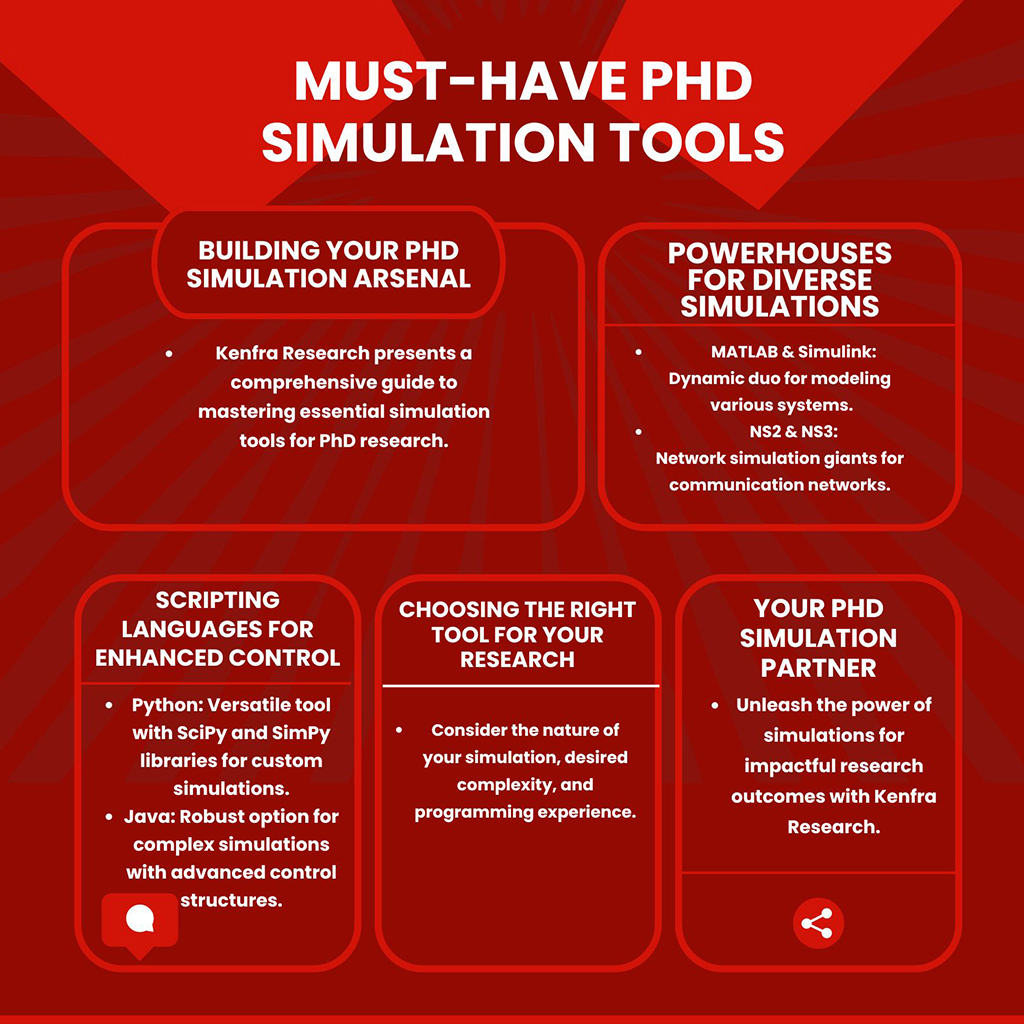Must-Have PhD Simulation Tools: Conquer Your Research with MATLAB, Simulink, and More
Kenfra2024-05-31T16:20:20+05:30Kenfra Research, your PhD success partner, equips you with the knowledge of powerful simulation tools to tackle diverse research problems. From dynamic systems to network modeling and beyond, this arsenal empowers you to explore, analyze, and validate your research hypotheses.
Must-Have PhD Simulation Tools:
The world of PhD research often involves complex systems, intricate networks, and dynamic processes. Simulation tools emerge as heroes in such scenarios, allowing you to create virtual representations and test hypotheses in a controlled environment. Here, we explore some of the most popular options in your PhD simulation toolbox:
Powerhouses for Diverse Simulations:
MATLAB & Simulink: This dynamic duo excels in modeling and simulating a wide range of systems, from electrical circuits to mechanical models. Simulink builds upon MATLAB’s foundation, providing a visual drag-and-drop interface for building simulations.
NS2 & NS3: Network simulation giants, NS2 and its successor NS3, are ideal for modeling and analyzing communication networks. They allow you to test network protocols, evaluate performance under various conditions, and optimize network design.
ANSYS: A powerhouse in engineering simulations, ANSYS tackles challenges in fluid dynamics, structural mechanics, and electromagnetics. It allows you to analyze real-world phenomena virtually, leading to valuable insights and design optimizations.
Scripting Languages for Enhanced Control:
Python: Python’s versatility extends to the realm of simulations. With libraries like SciPy and SimPy, you can develop custom simulations, analyze data, and create captivating visualizations.
Java: While not as widely used for simulations as Python, Java provides robust object-oriented programming capabilities. It can be valuable for building complex simulations requiring advanced control structures.
Choosing the Right Tool for Your Research:
With an array of options available, selecting the most suitable tool depends on your specific research needs. Here are some factors to consider:
The nature of your simulation: What type of system or process are you modeling?
Desired level of complexity: Do you need a general-purpose tool or a specialized one with advanced features?
Your programming experience: Consider your comfort level with different programming languages.
Kenfra Research: Your PhD Simulation Partner:
At Kenfra Research, we understand the power of simulation tools in PhD research. We offer a range of services to empower you:
Tool selection guidance: We help you identify the most appropriate simulation tools based on your research objectives.
Software training: We can connect you with resources or provide training on specific tools to enhance your simulation skills.
Data analysis support: Our team can assist with analyzing data generated from your simulations to extract valuable insights.
Unleash the Power of Simulation in Your Research:
By mastering these powerful simulation tools, you can gain deeper understanding of complex systems, validate your research hypotheses, and ultimately achieve impactful research outcomes. Partner with Kenfra Research and let us guide you through the exciting world of PhD simulation! Ready to build your PhD simulation arsenal? Contact Kenfra Research today for a free consultation!








Leave a Reply